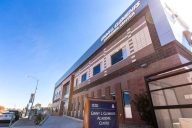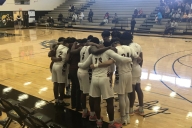You have /5 articles left.
Sign up for a free account or log in.
The National Labor Relations Board on Monday declined to assert jurisdiction over whether football players at Northwestern University may form a union.
The NLRB's vaguely written decision ends the drive to unionize at Northwestern, but left higher education, sports and labor experts divided on whether the ruling kills all efforts to unionize college football or just slows the movement down. In its order, the NLRB stated that it was not judging the merits of the players’ argument, and that the board could later return to the issue.
"The board went to great lengths to make sure the decision is very much limited in this instance to Northwestern and to college football players," said Dan Johns, a lawyer who leads Ballard Spahr's Higher Education Group and who specializes in labor organizing efforts at colleges. "But the board's underlying reasoning here makes it difficult to see another team having success."
The NLRB’s decision, while narrow, effectively reverses a ruling 16 months ago by the board's Chicago regional office saying that, under the National Labor Relations Act, scholarship football players at private universities are employees. In its original ruling, the Chicago office cited multiple factors that conclusion: scholarship football players perform services for the benefit of their employer and receive compensation in exchange, and they are “subject to the employer's control in the performance of their duties as football players.”
The players said their goals for collective bargaining included increasing scholarships and coverage for sports-related medical expenses, minimizing the risk of traumatic brain injury through measures like reduced contact in practice, improving graduation rates with help from an “educational trust fund,” and securing due process rights.
The university appealed the Chicago office’s decision to the full National Labor Relations Board in Washington, urging the board to reverse the regional director’s decision. In amicus briefs filed in July 2014, the university's argument was backed by at least eight other private colleges, six Republican members of Congress and the National Collegiate Athletic Association.
Two months earlier, Northwestern football players held a secret ballot to decide whether they would unionize, but the ballots were impounded due to the university’s appeal. With Monday's decision, those ballots will now be destroyed.
The NLRB, in declining to assert jurisdiction, noted that the issue of college football players unionizing affects both public and private institutions. And the NLRB has no authority over public institutions. So ruling in a case involving one private institution, the board suggested, would destabilize the competitive balance between public and private universities. addition here ok? dl**yup -jn
"Our decision is primarily premised on a finding that, because of the nature of sports leagues (namely the control exercised by the leagues over the individual teams) and the composition and structure of [Football Bowl Subdivision] football (in which the overwhelming majority of competitors are public colleges and universities over which the board cannot assert jurisdiction), it would not promote stability in labor relations to assert jurisdiction in this case," the board wrote in its unanimous decision.
Andrew Zimbalist, a professor of economics at Smith College, said that if the original ruling had been upheld, sweeping change could have come to NCAA sports, even though the ruling was specifically about private colleges. If players at a private college could collectively bargain for more rights and benefits, he said, then a public institution could be at a recruiting disadvantage. This could lead to public institutions adopting similar reforms in order to remain competitive -- or even allowing their own players to form unions, depending on state laws.
Some states had anticipated such a move, creating -- and in Michigan’s case, passing -- legislation that would ban players at public institutions from creating a union.
At a meeting in May organized by the Knight Commission on Intercollegiate Athletics, Lorry Spitzer, a tax lawyer and adjunct professor at Boston College Law School, said that allowing players to unionize would be "the end of the world" for the NCAA's current model. Others at the meeting agreed, and Henry Bienen, former president of Northwestern University, said that if the university was forced to consider college athletes as employees, he hoped the institution would leave big-time college sports behind.
In an article that appeared in Stanford University’s alumni magazine in September, President John Hennessy said the university would consider abandoning football if forced to treat players like employees.
In a statement Monday, Alan Cubbage, Northwestern's vice president for university relations, said the university was “pleased” by the NLRB's decision.
“As the university has stated previously, Northwestern considers its students who participate in NCAA Division I sports, including those who receive athletic scholarships, to be students, first and foremost,” Cubbage stated. “We applaud our players for bringing national attention to these important issues, but we believe strongly that unionization and collective bargaining are not the appropriate methods to address the concerns raised by student athletes.”
The NCAA also praised the outcome. Donald Remy, the NCAA's chief legal officer, called the ruling “appropriate,” and noted that NCAA members are working toward improving some of the conditions the union hoped to address, such as allowing full cost-of-attendance scholarships. A coalition representing 31 of the largest college athletics conferences released a similar statement, stating that “the NLRB made the right call.”
Senator Lamar Alexander, a Tennessee Republican and the labor committee's chair, chimed in as well, saying he agreed with the NLRB but was troubled by the board leaving “the question open for the future.”
Just how open that question is remains unclear. The NLRB noted that the “novelty” of the case was a factor in its decision, as it was the first time the board had been asked to rule on the unionization attempt of a single team within a larger league. Northwestern is one of just 17 private institutions in the 125-member Football Bowl Subdivision. It is the only private college in the Big Ten Conference.
The Atlantic Coast Conference, however, includes six private institutions. Would an ACC team have better luck if it chose to unionize?
"I'm not sure if anyone knows the real answer to that, because the board was fairly cryptic," said Bradford Livingston, a labor lawyer who testified during a congressional hearing last year that he was against allowing players to unionize. "The decision does not say what a big enough critical mass of private colleges in a conference would be to make it a level playing field. And what happens when you have schools playing outside their conferences? To compete, it takes two teams to play."
Livingston said that the open-ended nature of the decision might have more to do with politics than the board member's feelings on the issue. By saying it had no jurisdiction, the board was able to avoid ruling one way or another on the issue, while still mostly appeasing Republicans, who had been far more outspoken about the case than Democrats. The board, whose current members are mostly liberal and frequently rule in favor of unions, has drawn the ire of congressional Republicans, who have threatened to cut its funding.
Writing for Sports Illustrated, Michael McCann, founding director of the Sports and Entertainment Law Institute at the University of New Hampshire School of Law, also theorized the board may have felt pressured by "various constituencies" that did not want players to be recognized as employees. "This is especially curious given that the NLRB’s willingness to rule on graduate assistants and teaching assistants posed the accompanying risk of causing instability between private and public universities -- in other words, the very same risk of instability that the NLRB now cites as a key reason to decline to rule on the employment eligibility of college football players," McCann wrote.
The NLRB has been involved for many years in disputes over the rights of graduate teaching and research assistants at private universities. Its decision Monday indicates that the board does not view the graduate students and athletes as having similar legal issues with regard to collective bargaining rights. "And the scholarship players do not fit into any analytical framework that the board has used in cases involving other types of students or athletes," the decision states. "In this regard, the scholarship players bear little resemblance to the graduate student assistants or student janitors and cafeteria workers whose employee status the board has considered in other cases."
In a footnote, the decision says that "unlike those graduate assistants, the scholarship players are undergraduates, and -- with the potential exception of students seeking undergraduate degrees in physical education -- the football activities they engage in are unrelated to their course of study or educational programs."
While disappointed with the board's reasoning, Tim Waters, national political director of United Steelworkers, the largest labor union in North America and a supporter of the effort to unionize at Northwestern, said he was optimistic about the decision's vagueness. "They've left about 20 different points of wiggle room in this decision," Waters said. "It's an unfortunate setback, but not the end by any stretch. They've basically just punted the issue."
College sports reform advocates, such as David Ridpath, a professor of sports administration at Ohio University and president-elect of the Drake Group, said the decision is just "a speed bump." Others -- to their relief -- think the push to unionize has hit a dead end. In her statement praising the decision, Molly Corbett Broad, president of the American Council on Education, called the decision a "closing chapter.”
Johns, the higher education labor lawyer at Ballard Spahr, said while the decision still leaves the issue of college football unions on the table, its emphasis on Northwestern being one strand in a much larger web of primarily public institutions means that other teams hoping to organize will face a similar hurdle.
“On its face, the decision is not saying you can’t do it,” Johns said. “But I think if you read the reasoning behind the board’s decision, it means that unless something changes, such as the NCAA reorganizing in some drastic way, then it’s unlikely there will be a college football union.”
Ramogi Huma, who led the unionization efforts at Northwestern, declined to say whether he would try to unionize at another college. The NLRB's decision in the Northwestern situation cannot be appealed.
Even if the issue has little chance of resurfacing with the NLRB, the matter of whether college athletes are employees could instead be decided in federal court, said Eddie Comeaux, an associate professor of higher education at the University of California at Riverside. “The NLRB ruling is certainly a slight blow to the momentum of college athletes in the short run, but the climate is still increasingly favorable to athletes,” Comeaux said.
Citing the number of lawsuits about athletes' rights and benefits that are currently besieging the NCAA, Zimbalist also said that he doesn’t view an NLRB decision as the only way athletes could become employees or otherwise accomplish some of the goals the Northwestern players hoped to achieve.
“There are lots of avenues that still could open this up,” Zimbalist said. “I think there’s too much turmoil in college sports, frankly, too much turmoil to turn it back. The system we have now is very much in flux. We’re not at a point of equilibrium. We're at a point of great flux and uncertainty, and the Northwestern case is only one of the things that could knock this system off-kilter.”








